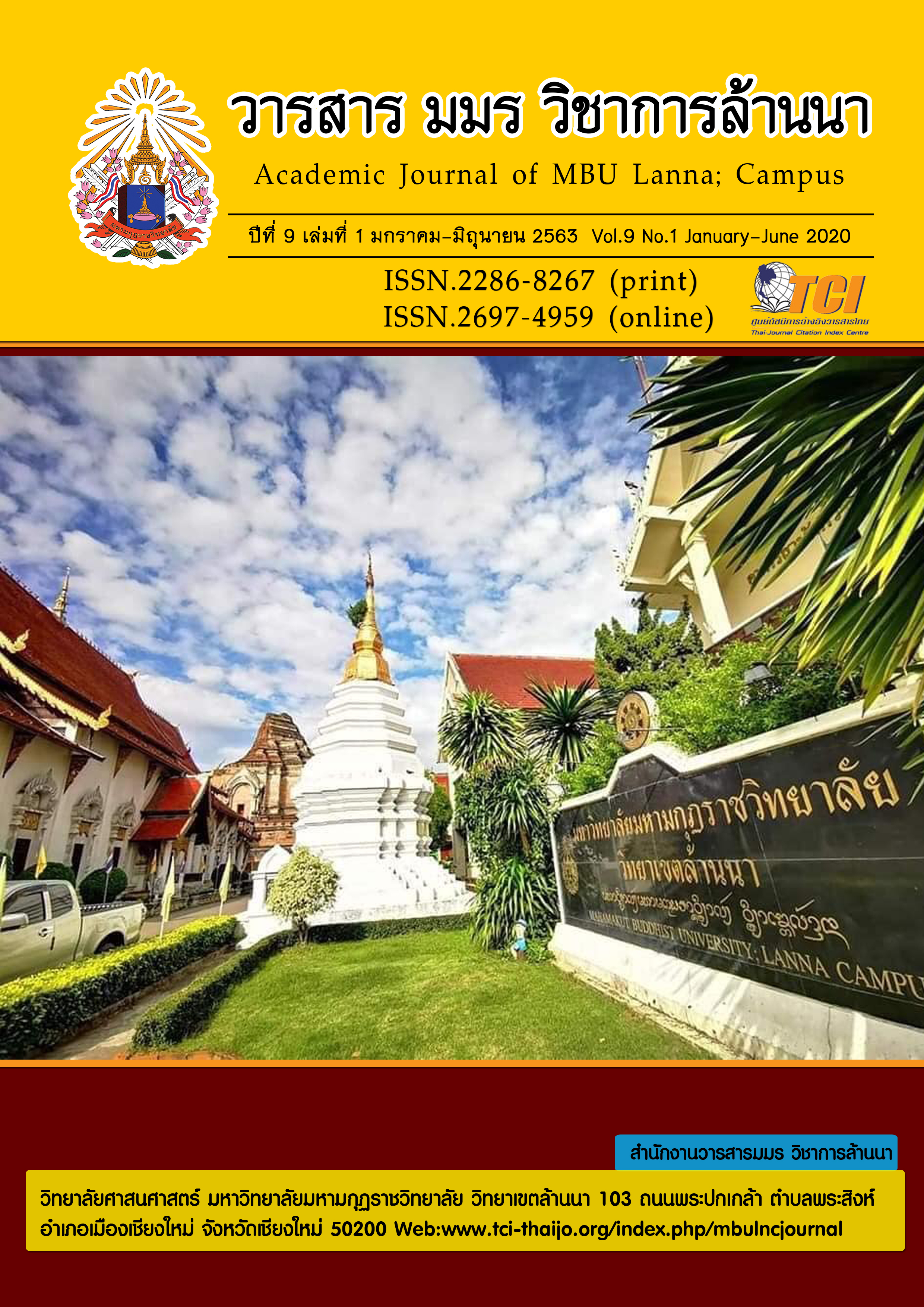ราวเทพยดากับผีสาง : เรื่องความท้าทายในที่ทำงานในประเทศไทย ที่อาจารย์ผู้สอนภาษาอังกฤษชาวต่างชาติประสบด้วยตนเอง
คำสำคัญ:
ครูต่างชาติ, ฃครูสอนภาษาอังกฤษ, ความท้าทายบทคัดย่อ
ชาวต่างชาติที่ทำงานในต่างประเทศอาจต้องเผชิญกับความท้าทายหลายประการที่ก่อให้เกิดปัญหายากที่จะแก้ไข การศึกษาครั้งนี้มุ่งเน้นวิเคราะห์การรับรู้ของผู้เข้าร่วมการวิจัยในเรื่องได้รับการปฏิบัติต่อที่แตกต่างไปจากคนอื่นทั้งในเชิงบวกและเชิงลบในขณะที่ทำงานในประเทศไทย กับเพื่อนร่วมงานและนักเรียนนักศึกษาชาวไทย งานวิจัยเชิงวาทกรรมวิเคราะห์นี้เป็นการศึกษาเรื่องราวส่วนบุคคลที่ได้จากการสัมภาษณ์ครูสอนภาษาอังกฤษชาวต่างชาติในโรงเรียนและมหาวิทยาลัยในภาคตะวันออกเฉียงเหนือของประเทศไทย ผู้เข้าร่วมการวิจัยทุกคนคิดว่าพวกเขาได้รับการปฏิบัติต่อที่แตกต่างไปจากเพื่อนร่วมงานและนักเรียนนักศึกษาชาวไทย ผู้เข้าร่วมงานวิจัยทุกคนทั้งที่เป็นเจ้าของภาษาคือพูดภาษาอังกฤษเป็นภาษาแม่และคนที่ใช้ภาษาอังกฤษเป็นภาษาที่สองหรือภาษาต่างประเทศสามารถระลึกได้ถึงประสบการณ์ที่บ่งชี้ได้เป็นนัยและประสบการณ์ที่เป็นที่ชัดเจนจงใจ อันแสดงถึงความเป็นอื่นของตนเองในสังคมไทย อย่างไรก็ตามครูผู้สอนภาษาอังกฤษชาวผิวขาวมีประสบการณ์การถูกปฏิบัติต่อในเชิงบวกมากกว่าครูผู้สอนภาษาอังกฤษคนเอเชียที่ไม่ได้เป็นเจ้าของภาษา ผลการวิจัยนี้อาจเป็นประโยชน์สำหรับโรงเรียนและมหาวิทยาลัยที่ต้องการปรับปรุงกระบวนการคัดเลือกครูผู้สอนภาษาอังกฤษและการฝึกอบรมครู รวมทั้งอาจเป็นจุดเริ่มต้นให้มีการศึกษาวิจัยในด้านนี้มากขึ้นต่อไป
เอกสารอ้างอิง
Allport, G. (1954). The nature of prejudice. Cambridge, MA: Addison-Wesley.
Bishop, P., Phusion, T. & Malasri, A. (2016). The development of evaluation indicators for foreign teachers teaching English subject in the basic education level of Thailand. Journal of Educational Measurement Mahasarakham University, 22(2), 247-261.
Blommaert, J. (2010). The sociolinguistics of globalization. Cambridge: Cambridge University Press.
Bourdieu, P. (1977). The economics of linguistic exchanges. Social Sciences Information, 16(6), 645-668.
Canagarajah S. (1999). Resisting linguistic imperialism. Oxford: Oxford University Press.
Chandang, M. & Sumettikoon, P. (2017). A study of foreign teacher’s management of private bilingual schools in Bangkok metropolis. OJED, 12(1), 402-416.
Cortina, L. M. (2008). Unseen injustice: incivility as modern discrimination in organizations. Academy of Management Review, 33(1): 55-75.
Crocker, J., Major, B. & Steel C. (1998). Social stigma. In D.T. Gilbert, S.T. Fisk & G. Lindzey (EDs), The handbook of social psychology, Vol. II (4th ed.). New York: McGrew-Hill, 504-53.
Crystal, D. (1997). English as a global language. Cambridge, UK: Cambridge University Press.
Deitch, E.A., Barsky. A., Butz, R.M., Chan, S., Brief, A.P., and Brabdley, J.C. (2003). Subtle yet significant: The existence and impact of everyday racial discrimination in the workplace. Human Relation, 56(11): 1299-1324.
Dipboye, R.L. & Halverson, S.K. (2004). Subtle and (and not so subtle) discrimination in organizations. In: Griffith RW and O’ Leary-Kelly AM (eds) The dark side of organizational behavior. San Francisco, CA: Jossey-Bass, 131-158.
Dovidio, J.F. & Hebl, M.R. (2005) Discrimination at the level of the individual: Cognitive and affective factors. In: Dipboye, R.L. and Colella, A. (eds) Discrimination at work: the psychological and organizational bases. Mahwah, NJ: Lawrence Erlbaum Associates, 11-35.
Essed, P. (1991). Understanding everyday racism. Newbury Park, CA: Sage.
Evans, C. (1993). English People: the Experience of teaching and learning English in British Universities. Buckingham: Open University.
Fairclough, N. (1995). Critical discourse analysis. Boston: Addison Wesley.
Fiske, S.T. (1998). Stereotyping, prejudice, and discrimination. In D. T. Gilbert, S. T. Fiske, & G. Lindzey (Eds.), The Handbook of social psychology (p. 357-411). New York: McGraw-Hill.
Gleeson, T. (2012). Developing a training program for foreign teachers teaching English language at the secondary education level according to the standards of teaching profession in Thailand. EAU Heritage Journal, 2(1), 35-42.
Grin, F. (2001). English as economic value: facts and fallacies. World Englishes, 20(1), 65-78.
Gutek, B. A., Cohen, A.G., & Tsui, A. (1996). Reaction to perceive sex discrimination. Human Relation, 49(6), 791-813.
Holliday, A.R. (2005). The struggle to teach English as an international language. Oxford: Oxford University Press.
Hoy, T. (2009). To their fullest potential: job satisfaction and foreign university teachers in Thailand. Journal of Studies in the English Language, 4.
Ketkaew, O. (2011). Cross-cultural communication challenges experienced by American missionaries working in Thailand. (Master's theses, Ubon Ratchathani University).
Mackey, A. & Gass, S.M. (2005). Second language research: methodology and design. New York: Routledge.
Park, J.S-Y. & Wee, L. (2014). Markets of English: linguistic capital and language policy in a globalizing world. London: Routledge.
Park, J.S-Y. (2011). The Promise of English: linguistic capital and the neoliberal worker in the South Korean job market. International Journal of Bilingual Education and Bilingualism, 14(4), 443-455.
Phillipson, R. (1992). Linguistic imperialism. Oxford: Oxford University Press.
Sipe, M.D. (2011). The effects of cross-cultural issues on language learning in Thai classrooms. HRD Journal, 2(2), 98-108.
Smalley, W. A. (1994). Linguistic diversity and national unity: language ecology in Thailand. Chicago: The University of Chicago Press.
Vandenhole, W. (2005). Non-discrimination and equality in the view of the UN human rights treaty bodies. Oxford: Intersentia.
Waldinger, R., & Lichter, M. I. (2003). How the other half works: immigration and the social organization of labor. Berkeley: University of California Press.
ดาวน์โหลด
เผยแพร่แล้ว
รูปแบบการอ้างอิง
ฉบับ
ประเภทบทความ
สัญญาอนุญาต
ผลการวิจัยและความคิดเห็นที่ปรากฏในบทความ ถือเป็นความคิดเห็นและอยู่ในความรับผิดชอบของผู้เขียนบทความ มิใช่ความเห็นหรือความรับผิดชอบของกองบรรณาธิการ หรือมหาวิทยาลัยมหามกุฏราชวิทยาลัย วิทยาเขตล้านนา ทั้งนี้ไม่รวมความผิดพลาดอันเกิดจากการพิมพ์
บทความที่ได้รับการเผยแพร่โดยวารสาร มมร วิชาการล้านนาถือเป็นสิทธิ์ของวารสารฯ



